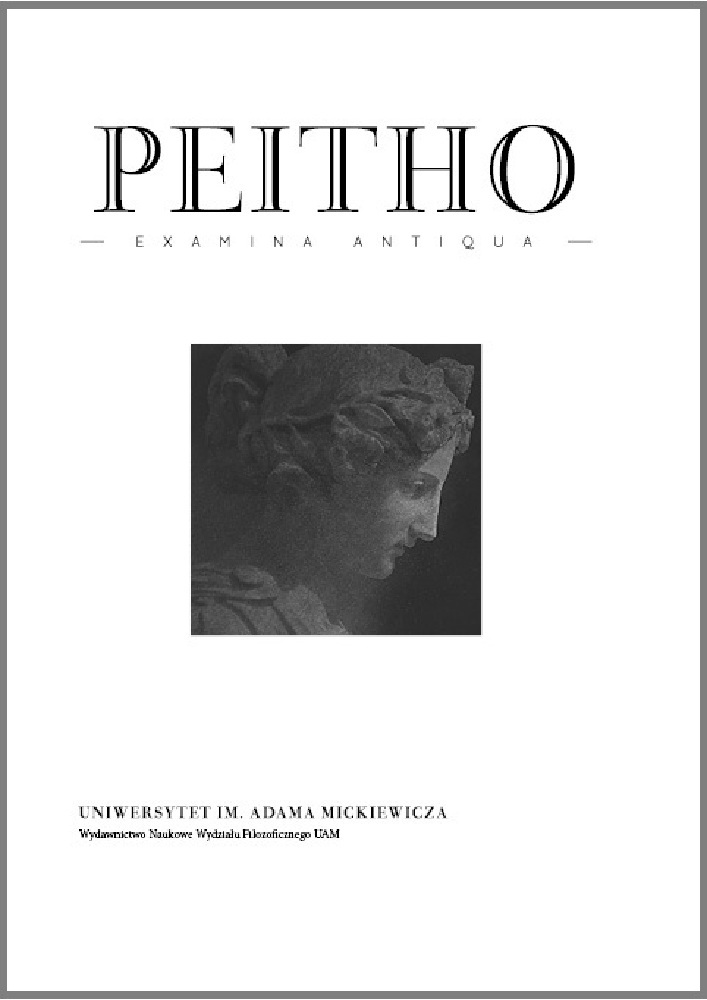Abstract
This paper discusses the theoretical relationship between the views of Damascius and those of Pseudo-Dionysius the Areopagite. While Damascius’ De principiis is a bold treatise devoted to investigating the hypermetaphysics of apophatism, it anticipates various theoretical positions put forward by Dionysius the Areopagite. The present paper focuses on the following. First, Damascius is the only ancient philosopher who systematically demonstrates the first principle to be infinite (traditional Greek thought tended to regard the arkhē as finite). Second, Damascius modifies the concept and in several important passages shows the infinite to be superior and prior to the finite (previously this assumption was held only by Melissus and, sporadically, by Gregory of Nyssa and Plotinus). Third, Damascius’ theory of being (infinite, endless and ultrarational) is the strongest ancient articulation of the nature of the One which is a clear prefiguration of the negative theology developed by Dionysius the Areopagite.
References
AGAMBEN, G., 1990, La comunità che viene, Torino.
AGAMBEN, G., 2013, Idea della prosa, Macerata.
CASERTANO, G., 2010, I presocratici, Roma.
COMBÈS, J., 1996, Études néoplatoniciennes (1989¹), Grenoble.
CURIELLO, G., 2013, “Pseudo-Dionysius and Damascius: An Impossible Identification”, Dionysius 31, pp. 101–115.
DAMASCIUS, 1986–1991, Traité des Premiers Principes, L. G. Westerink, J. Combès (eds.), 3 voll., Paris.
DIONIGI AREOPAGITA, 2009, Tutte le opere, P. Scazzoso, E. Bellini (cur.), Milano.
GIRGENTI, G., 1996, Il pensiero forte di Porfirio: mediazione fra henologia platonica e ontologia aristotelica, Milano.
GRIFFITH, R., 1997, Neo-Platonism and Christianity, Pseudo-Dionysius and Damascius, in: E. A. Livingstone (ed.), Studia patristica XXIX. Papers Presented at the 12th International Conference on Patristic Studies Held in Oxford 1995, Leuven, pp. 238–243.
HÄGG, F. H., 2006, Clement of Alexandria and the Beginnings of Christian Apophatism, Oxford–New York.
JAEGER, W., 1964, Die Theologie der frühen griechischen Denker, Stuttgart.
KIRK, G. S., RAVEN, J. E., 1957, The Presocratic Philosophers, Cambridge.
LILLA, S. R. C., 1991–1992, “La teologia negativa dal pensiero greco classico a quello patristico e bizantino”, Helikon 31–32, pp. 3–72.
LILLA, S. R. C., 1997, Pseudo-Denys l’Aréopagite, Porphyre et Damascius, in: Y. de Andia (cur.), Denys l’Aréopa¬gite et sa posterité en orient et occident, Paris, pp. 117–152.
LILLA, S. R. C., 2005, Dionigi l’Areopagita e il platonismo cristiano, Brescia.
LILLA, S. R. C., 2013, Il silenzio nella filosofia greca (presocratici, Platone, giudeo-ellenismo, ermetismo, medio¬platonismo, oracoli caldaici, neoplatonismo, gnosticismo, Padri greci): galleria di ritratti e raccolta di testimo¬nianze, Roma.
LINGUITI, A., 1990, L’ultimo platonismo greco. Principi e conoscenza, Firenze.
MAZZUCCHI, C. M., 2013, “Iterum de Damascio Areopagita”, Aevum 87, pp. 249–265.
MELISSO, 1970, Testimonianze e frammenti, G. Reale (cur.), Firenze.
METRY-TRESSON, C., 2012, L’aporie ou l’expérience des limites de la pensée dans le Péri Archôn de Damaskios, Leiden–Boston.
MONDOLFO, R., 2012, L’infinito nel pensiero dell’antichità classica (1934¹), Milano.
NAPOLI, V., 2004, “Note sulla chiusura della Scuola neoplatonica di Atene”, Schede Medievali 42, pp. 53–96.
NAPOLI, V., 2005, “Conoscibilità e inconoscibilità dell’Uno nella lettura di Damascio della Repubblica di Plato¬ne”, Pan 23, pp. 183–208.
NAPOLI, V., 2008, Ἐπέκεινα τοῦ ἑνός. Il principio totalmente ineffabile tra dialettica ed esegesi in Damascio, Catania.
OTTOBRINI, T., 2016, “Filosofi greci a Baghdad dopo il 529: gli ultimi neoplatonici al confine tra mondo greco, regno persiano e tradizione araba”, Cultura giuridica e diritto vivente 3, pp. 77–90.
PROCLUS, 1933 (1963²), The Elements of Theology, E. R. Dodds (ed.), Oxford.
PROCLUS, 2007–2009, Procli in Platonis Parmenidem commentaria, C. G. Steel, L. van Campe (eds.), 3 voll., Oxford (citato secondo la paginazione di V. Cousin, 1864).
PSEUDO-DIONYSIUS AREOPAGITA, 1990, Corpus Dionysiacum, B. R. Suchla, G. Heil, A. M. Ritter (hrsg.), 2 voll., Berlin–New York.
SIMPLICIUS, 1882–1895, Simplicii in Aristotelis Physicorum commentaria, 2 voll., H. Diels (ed.), Berolini.
SWEENEY, L., 1957, “Infinity in Plotinus”, Gregorianum 38, pp. 515–535, 713–732.
TRABATTONI, F., 1985, “Per una biografia di Damascio”, Rivista di storia della filosofia 40, pp. 179–201.
TRABATTONI, F., 2016, “Il labirinto delle aporie. Su una recente monografia dedicata a Damascio”, Méthexis 28, pp. 141–151.
VLAD, M., 2004, “De principiis: de l’aporétique de l’Un à l’aporétique de l’Ineffable”, Chôra: Revue d’Études Anciennes et Médiévales 2, pp. 125–148.
VLAD, M., 2012a, “Discours et suppression du discours dans le De principiis de Damascius”, Historia Philoso¬phica 10, pp. 25–40.
VLAD, M., 2012b, “Inéluctable totalité: Damascius et l’aporie du principe au-delà du tout”, Synthesis Philoso¬phica 27, pp. 141–157.
VLAD, M., 2013, “Damascius et la divination du principe incoordonné”, Revue Philosophique de Louvain 111, pp. 469–490.
VLAD, M., 2014, “Discourse and Suppression of Discourse in Damascius’ De Principiis”, Rhizomata 2, pp. 213–233.
VLAD, M., 2016a, “Damascius and Dionysius on Prayer and Silence”, in: J. Dillon, A. Timotin (eds.), Platonic Theories of Prayer, Leiden–Boston, pp. 192–212.
VLAD, M., 2016b, “Defying Words: Damascius and the Travail of the Unsayable”, Chôra: Revue d’Études Ancien¬nes et Médiévales 14, pp. 223–247.
VLAD, M., 2017, “Stepping into the Void: Proclus and Damascius on Approaching the First Principle”, Journal of the Platonic Tradition 11, pp. 44–68.
License
Peitho provides immediate open access to its content on the principle that making research freely available to the public supports a greater global exchange of knowledge.
